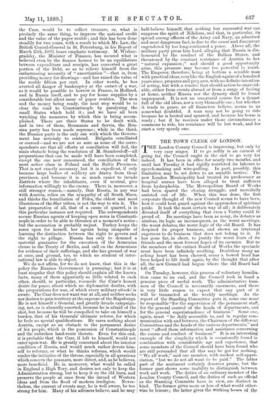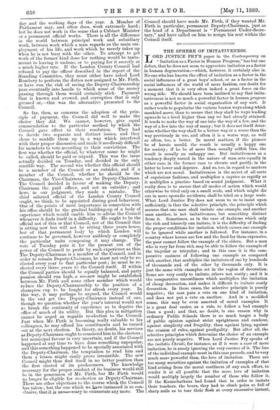THE TOWN CLERK OF LONDON. T HE London County Council is
improving, but only by very easy stages. If to go softly is an earnest of going far, the Council ought in the end to go very far indeed. It has been in office for nearly two months, and until last Tuesday it had rigidly restricted its labours to speech-making and wire-pulling. In part, possibly, this limitation may be set down to an amiable motive. The new London Municipality had treated its predecessor as hospital nurses have been alleged to treat sufferers from hydrophobia. The Metropolitan Board of Works had been spared the closing struggle, and mercifully assisted out of life. When this was done, the first corporate thought of the new Council seems to have been, how it could best guard against the approaches of spiritual pride. It took the most certain way of all ; it deliberately divested itself of everything that even a Vestry could be proud of. Its meetings have been as noisy, its debates as aimless, its logic as inconsequent, as the worst meetings, the worst debates, the worst logic of the old Board. It has despised its proper business, and shown an irrational eagerness to do business that does not belong to it. It has gone far, in short, to justify the worst fears of its friends and the most fervent hopes of its enemies. But to the members of the extinct Board of Works the spectacle must have been infinitely soothing. Doubtless many an aching heart has been cheered, many a bowed head has been helped to lift itself again, by the thought that after all, the new Council had, begun where the old Board had left off.
On Tuesday, however, this process of voluntary humilia- tion came to an end, and the Council took in hand a genuine piece of useful work. The administrative busi- ness of the Council is necessarily enormous, and there is very little reason to expect that any part of it will be transacted at the weekly meetings. As the report of the Standing Committee puts it, some one must be responsible "for the supervision of the permanent staff, for the general control of the heads of departments, and for the general superintendence of business." Some one, again, must "be daily accessible to, and in regular com- munication with and between, the Chairmen of the different Committees and the heads of the various departments," and must "afford them information and assistance concerning the course and conduct of business." It is an interesting example of the simplicity which is occasionally found in combination with considerable age and experience, that some members of the Council should have been found who are still persuaded that all this may be got for nothing. "We all work," said one member, with modest self-appre- ciation, "but we do not all want to be paid." The latter part of the sentiment certainly deserves praise, but the former part shows some inability to distinguish between work and work. The duties of an ordinary member of the London County Council, and the duties of such an official as the Standing Committe have in view, are distinct in kind. The former gives more or less of what would other- wise be leisure ; the latter gives the working hours of the day and the working days of the year. A Member of Parliament may, and often does, work extremely hard ; but he does not work in the sense that a Cabinet Minister or a permanent official works. There is all the difference in the world between principal work and subsidiary work, between work which a man regards as the main em- ployment of his life, and work which he merely takes up when he is not busy with the other. To attempt to get work of the former kind done for nothing would be tanta- mount to leaving it undone, or to paying for it secretly at a much higher rate. If the London County Council had refused to pay the officer described in the report of the Standing Committee, they must either have asked Lord Rosebery to perform the duties now assigned to Mr. Firth, or have run the risk of seeing the Deputy-Chairmanship pass eventually into hands to which some of the money passing through them would certainly stick. Payment that is known and avowed, and corruption that is only guessed at,—this was the alternative presented to the Council.
So far, then, as concerns the adoption of the prin- ciple of payment, the Council did well to make the choice they did. We cannot, however, give equal commendation to the particular method by which the Council gave effect to their resolution. They had to decide two separate and distinct issues, and they chose to muddle them up in a way which interfered with their proper discussion and made it needlessly difficult for members to vote according to their convictions. The first was whether the official, by whatever name he might be called, should be paid or unpaid. This was the issue actually decided on Tuesday, and decided in the only sensible way. The second was whether this official should be a member of the Council or an outsider, and if a member of the Council, whether he should be the Chairman, the Vice-Chairman, or the Deputy-Chairman. The Council decided in favour of making the Deputy- Chairman the paid officer, and not an outsider ; and here, in our judgment, they made a mistake. The chief salaried official of the London County Council ought, we think, to be appointed during good behaviour. One of the points of most importance in connection with his office should be the gradual building-up of a body of experience which would enable him to advise the Council whenever it finds itself in a difficulty. He ought to be the official not of this or that Council, not of the Council that is sitting now but will not be sitting three years hence, but of that permanent body by which London will continue to be governed, however suddenly or completely the particular units composing it may change. The vote of Tuesday puts it for the present out of the power of the Council to profit by such experience as this. The Deputy-Chairman is a member of the Council, and in order to remain Deputy-Chairman, he must not only be re- elected every year to that particular post ; he must be re- elected every three years to the Council itself. If within the Council parties should be equally balanced, and party passion should run high, a see-saw might be established between Mr. Firth and some other member which would reduce the Deputy-Chairmanship to the position of a champion cup to be fought for afresh every year. In this way, it may perhaps be argued, the Council would in the end get two Deputy-Chairmen instead of one, though we question whether the year's interval would not so break the continuity of experience as to deprive the office of much of its utility. But this plea in mitigation cannot be urged as regards re-election to the Council. Just when Mr. Firth is becoming really valuable to his colleagues, he may offend his constituents and be turned out at the next election. In theory, no doubt, his services as Deputy-Chairman ought to commend him to the electors ; but municipal favour is very uncertain, and if the Council happened at any time to have done something unpopular, and this something happened to be specially associated with the Deputy-Chairman, the temptation to read him and them a lesson might easily prove irresistible. The new Council might thus find itself in no better position than the first elected of its predecessors. The knowledge necessary for the proper conduct of its business would still be in the possession of Mr. Firth, but Mr. Firth would no longer be eligible for re-election as Deputy-Chairman. There are other objections to the course which the Council has taken ; but the one which we have instanced is so con- clusive, that it in unruaoessary to enumerate any more. The Council should have made Mr. Firth, if they wanted Mr. Firth in particular, permanent Deputy-Chairman, just as the head of a Department is "Permanent Under-Secre- tary," and have called on him to resign his seat within the Council itself.







































 Previous page
Previous page